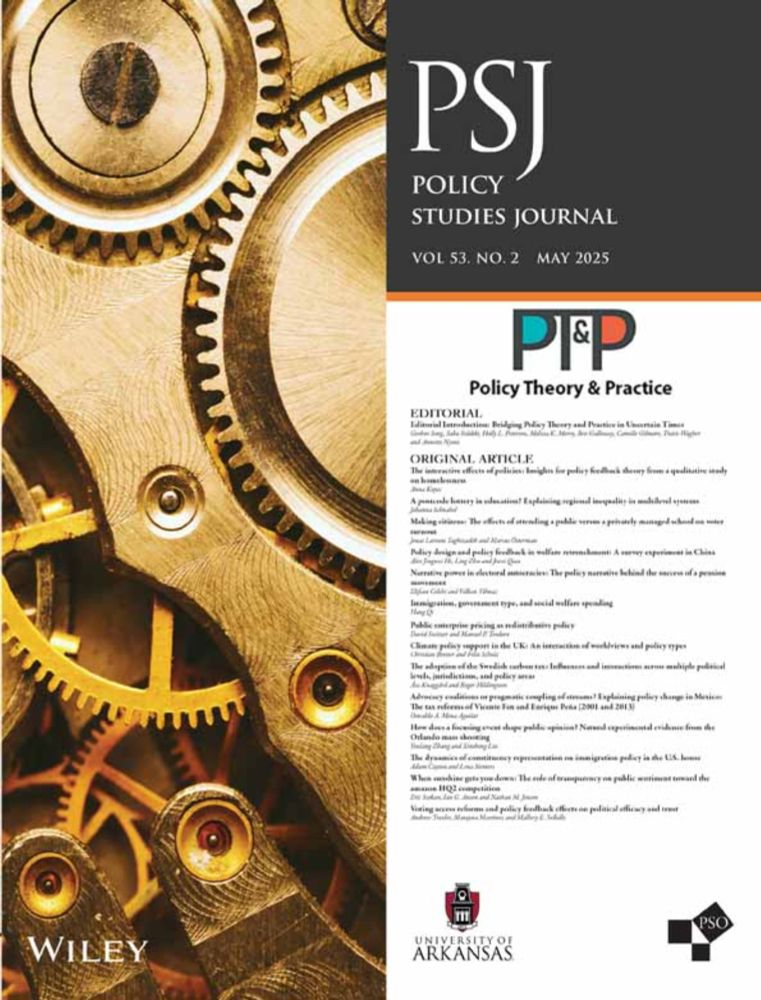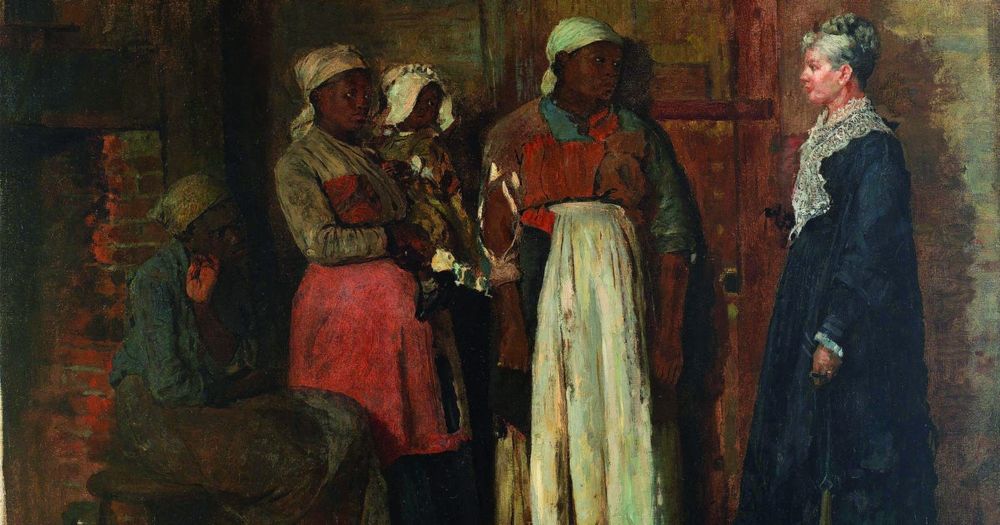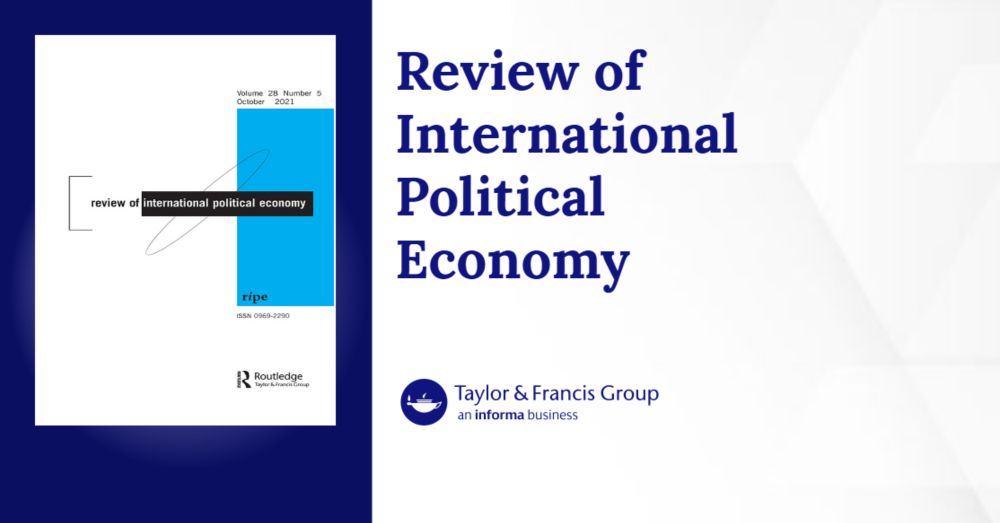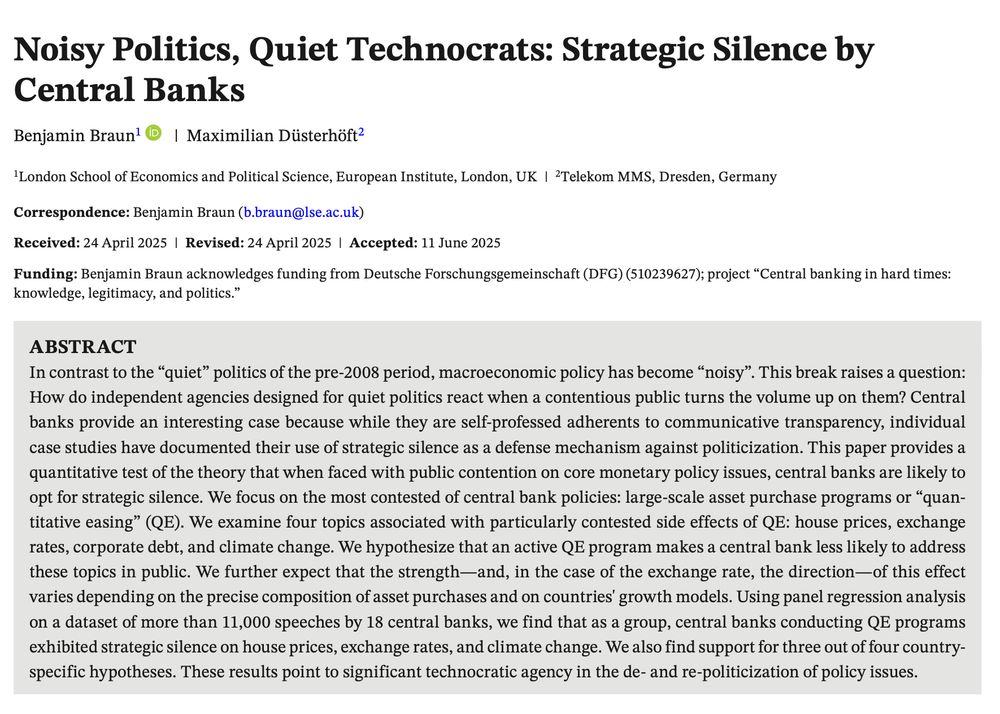
Screenshot of the title page of linked article:
"Noisy Politics, Quiet Technocrats: Strategic Silence by Central Banks"
By Benjamin Braun and Maximilian Düsterhöft
🚨New article🚨 The consensus is that contestation pushed central banks to talk 𝘮𝘰𝘳𝘦 about inequality & climate.
Our theory: At first, CBs seek to ward off politicization by talking 𝘭𝘦𝘴𝘴 about controversial topics.
We tested this 𝐬𝐭𝐫𝐚𝐭𝐞𝐠𝐢𝐜 𝐬𝐢𝐥𝐞𝐧𝐜𝐞 𝐡𝐲𝐩𝐨𝐭𝐡𝐞𝐬𝐢𝐬.🧵
onlinelibrary.wiley.com/doi/10.1111/...
01.07.2025 10:11 — 👍 79 🔁 31 💬 2 📌 5

I have joined hundreds of other Israeli academics in calling on our academic system to take immediate action against the war in Gaza—for the sake of the lives that can still be saved and for our future here.
Full letter (English follows Hebrew & Arabic): docs.google.com/document/d/1...
23.05.2025 15:04 — 👍 12 🔁 3 💬 0 📌 0
This was the moment, just over a month ago, when the ADL could've put an end to Republicans doing Nazi salutes. They didn't. They chose instead to provide cover by calling it "an awkward gesture in a moment of enthusiasm." Now the sieg heil salute has been normalized.
The ADL literally had ONE JOB.
22.02.2025 20:08 — 👍 4656 🔁 1305 💬 156 📌 88
Thanks a lot Jens!
16.02.2025 17:06 — 👍 0 🔁 0 💬 0 📌 0
Most importantly - thanks so much to
@elicook.bsky.social @reutmar.bsky.social @jensarnholtz.bsky.social @schoefer.bsky.social
@jonathanpreminger.bsky.social @gpicot.bsky.social
16.02.2025 15:29 — 👍 3 🔁 0 💬 0 📌 0
8/8
This opens important questions about:
- Professionalization of labor politics
- Trade-offs between different power resources
- How expertise shapes interest representation
- Future of industrial relations in an era of growing complexity
16.02.2025 15:29 — 👍 0 🔁 0 💬 1 📌 0
7/8
The Israeli case illustrates broader trends in advanced economies. As unions face declining power & increasing complexity, they turn to professional experts. But this "professional power" comes with its own logic that affects how class interests are represented
16.02.2025 15:29 — 👍 0 🔁 0 💬 1 📌 0
6/8
Theoretical contribution: We develop a novel framework bridging industrial relations & power resource theories with literature on economists' political influence. Show how unions adopt new power resources as traditional ones decline - but this adoption reshapes union identity & goals
16.02.2025 15:29 — 👍 0 🔁 0 💬 1 📌 0
5/8
But there's tension: While economists strengthen unions' bargaining position through their expertise & legitimacy, they also reshape HOW workers' interests are represented. This creates conflicts between economists' "professional power" & unions' traditional organizational power
16.02.2025 15:29 — 👍 0 🔁 0 💬 1 📌 0
4/8
The consequences? Economists bring their professional dispositions into unions. They promote:
- Depoliticized view of industrial relations
- "Market-friendly" solutions
- Performance-based pay
- Focus on firm sustainability
This transforms how unions define & pursue their goals
16.02.2025 15:29 — 👍 0 🔁 0 💬 1 📌 0
3/8
We identify two key drivers:
1) Rising complexity of industrial relations - decentralized bargaining & new compensation schemes require sophisticated economic analysis
2) Union's declining power - economists provide an alternative "professional power" resource as traditional union power weakens
16.02.2025 15:29 — 👍 0 🔁 0 💬 1 📌 0
2/8
This is puzzling because neoclassical economics, which shapes mainstream economists' expertise, is inherently skeptical of labor market interventions. Yet, the Histadrut's Economics Division has become central to union strategy and bargaining. Why? And what are the consequences?
16.02.2025 15:29 — 👍 0 🔁 0 💬 1 📌 0
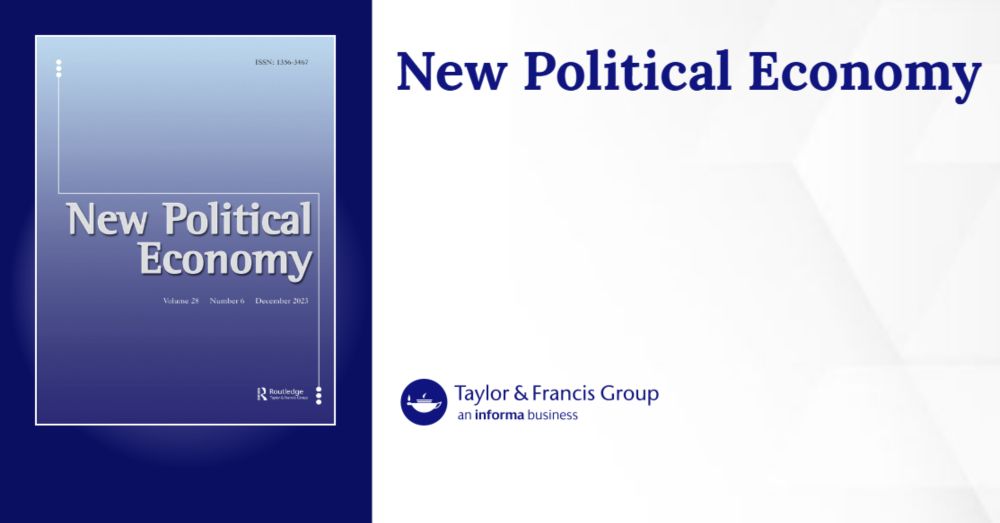
An odd couple? When mainstream economists join forces with trade unions
The doubtful tendencies of neoclassical economics towards labour market intervention put it at odds with trade unions, whose raison d’etre is worker protection through de-linking compensation from ...
1/8
New (open access) paper with @assafbondy.bsky.social in NPE explores a puzzling phenomenon: How do mainstream economists become key players in trade unions? We examine the case of Israel's Histadrut, where economists gained pivotal positions in collective bargaining. 🧵
doi.org/10.1080/1356...
16.02.2025 15:29 — 👍 6 🔁 3 💬 1 📌 2
A new blogpost with Tami Oren on how short-term post-2008 interventions have evolved into long-term changes in macroeconomic policy. The post is based on our recently published article @ripejournal.bsky.social (open access) (link to article in first comment)
08.01.2025 13:21 — 👍 1 🔁 0 💬 1 📌 0
Thanks! I didn't :-)
Looks really useful!
02.01.2025 11:22 — 👍 0 🔁 0 💬 0 📌 0
I am planning a survey experiment regarding people's attitudes on macroeconomic policy; I want to include a battery of questions regarding macroeconomic literacy. Any recommendations for existing surveys/studies which already did that? Thanks!
02.01.2025 09:25 — 👍 2 🔁 1 💬 2 📌 0

finally, an FT piece that connects the crisis of liberal democracies to macrofinancial politics - though it misses the elephant in the room: the institutional status-quo put in place by neoliberalism
24.12.2024 10:06 — 👍 66 🔁 22 💬 4 📌 2
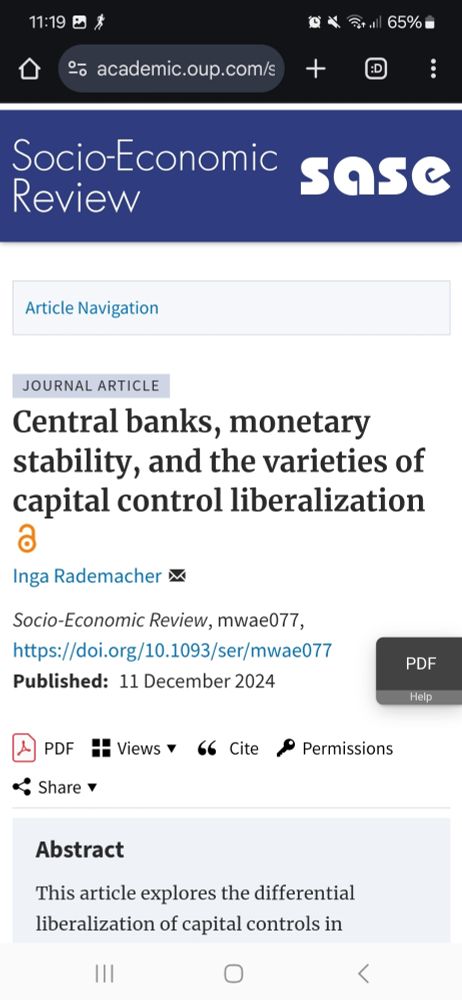
My new article is out!! Capital controls critically shaped the evolution of export/finance-led economies. The Bundesbank used controls on innovative financial products until 1998 and hindered Frankfurt's development into a vibrant financial hub doi.org/10.1093/ser/...
16.12.2024 11:25 — 👍 47 🔁 11 💬 2 📌 1

אז מה זה בעצם אגף התקציבים באוצר? ואיך הוא הפך מגוף שתפקידו לשמור על קופת המדינה לגוף שקובע את המדיניות הכלכלית בישראל?
אירחתי בפודקאסט "נותנים עבודה" את @mandelkern.bsky.social מרצה באונ' ת"א ועמית מחקר בכיר בפורום ארלוזורוב על איך עובד אגף התקציבים ועל הדרך לאזן את כוחו מול משרדי הממשלה המקצועיים.
15.12.2024 18:03 — 👍 6 🔁 1 💬 1 📌 0
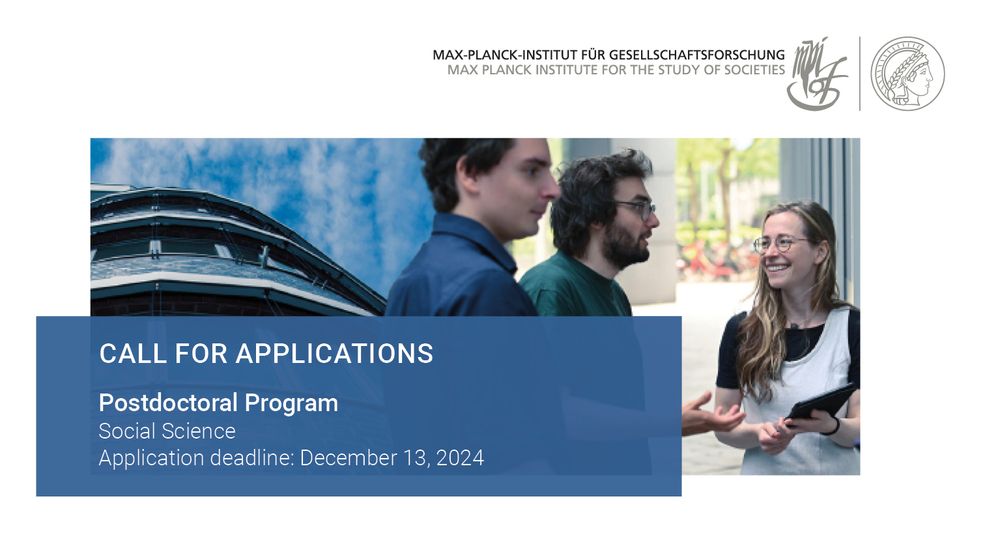
Application deadline: December 13, 2024
Reminder:
The application deadline for our postdoctoral program is coming up next Friday!
We welcome applications from postdoctoral researchers in political economy, economic sociology and sociology of low-carbon transitions.
s.gwdg.de/2v6csN
06.12.2024 12:39 — 👍 13 🔁 7 💬 0 📌 0
Just created this starter pack. Let me know if you would like me to add you!
go.bsky.app/ptifSR
18.11.2024 09:39 — 👍 86 🔁 36 💬 26 📌 5
Thanks Onur! Can you please add me?
18.11.2024 15:06 — 👍 0 🔁 0 💬 1 📌 0
Yes, but the whole point of what we refer to as “the system” is that it follows certain rules which are free of such control, right? Or to be more accurate, this is how “non anti-system” politics view the state apparatus...
17.11.2024 15:50 — 👍 0 🔁 0 💬 1 📌 0
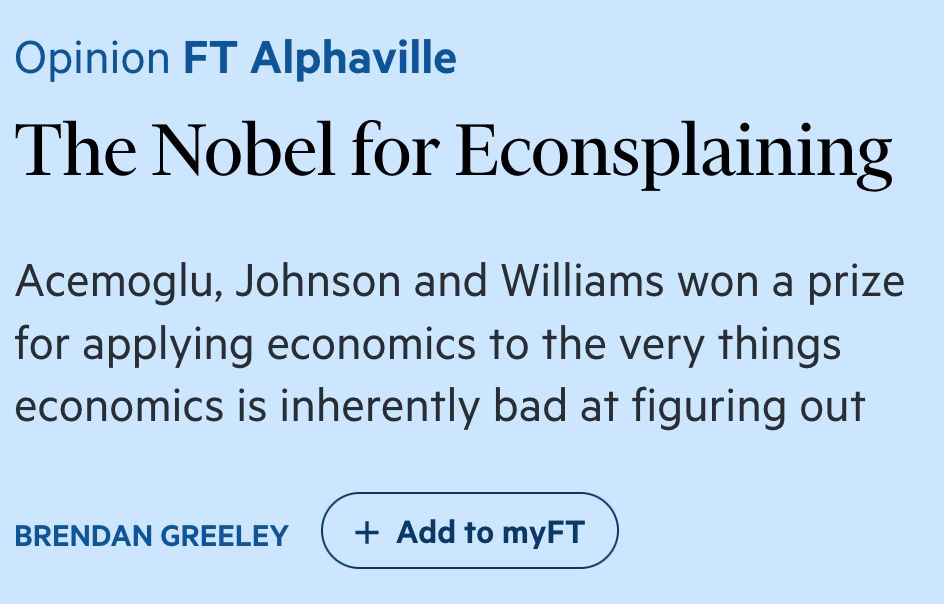
Please use the sharing tools found via the share button at the top or side of articles. Copying articles to share with others is a breach of FT.com T&Cs and Copyright Policy. Email licensing@ft.com to buy additional rights. Subscribers may share up to 10 or 20 articles per month using the gift article service. More information can be found at https://www.ft.com/tour.
https://www.ft.com/content/1e2584d6-65ef-46de-bfb2-28811be65600
The Nobel for Econsplaining
Acemoglu, Johnson and Williams won a prize for applying economics to the very things economics is inherently bad at figuring out
Brendan Greeley
A lot of fun to read, this from @bhgreeley.bsky.social (if you're not an economist).
www.ft.com/content/1e25...
21.10.2024 07:12 — 👍 71 🔁 27 💬 6 📌 5
Peer-reviewed journal of the American Political Science Association, cultivating a political science public sphere.
https://apsanet.org/publications/journals/perspectives-on-politics/
PS: Political Science & Politics is the journal of record for the discipline. Email: ps@apsanet.org. Co-editors: Lina Benabdallah, Justin Esarey, Peter Siavelis, Betina Wilkinson.
Assistant Professor @ Imperial Business School, formerly LSE & Bank of England
Macroeconomist interested in distributional effects of macro policy.
patrickmschneider.com
Economist at World Bank and Visiting Scholar at Brown University
Mostly Political Economy .
but also the odd yarn! Reposts don't necessarily represent my views.
Professor of Political Science at University of Vienna. Interested in political economy, especially in Europe's East.
Philosophy. PhD @ UofToronto. Postdoc @ Hebrew U (and Tel-Aviv U; and UofHaifa). All opinions are cognitive attitudes.
Associate Professor (Reader), soas @soasuni.bsky.social, researching Palestine/Israel history. Race, migration, material culture, Antisemitism. "City in Fragments" (Stanford 2020) Currently working on Ashkenazi integration in the Arab Levant
Transparency, regulation, business & interest group politics, and polisci metascience. Run @apsa.bsky.social DDRIG. Go 'Cats. Always a Midwest Princess 👑
Senior Lecturer, University of Liverpool, Arab states' political economy. Views my own, not my employer's. Author "Citizen Hariri: Lebanon's neoliberal reconstruction". He/him
For an equitable #postgrowth world 🌿Post Growth Fellowship, Post Growth Alliance, Offers & Need Markets, Free Money Day & more🌍 @postgrowth@mastodon.social
Economics Professor, New School for Social Research; Emeritus Professor of Economics & Finance, Monmouth University; contributor to Washington Spectator; former editor, Review of Political Economy; author/editor of many books, including 50 Major Economists
Political Economist at the University of Cambridge.
Industrial relations, sociology of work, employee ownership, political economy, kayaking, music, Palestine, Israel
Assistant Prof. of Sociology @ U of Haifa. Previously: Stanford, Hebrew U. Studying algorithms & culture, AI ethics, AI Hype, data infrastructures, microbiomic futures & more.
Comparative political economy, welfare states, industrial relations, minimum wages
Professor in Comparative Politics at University of Bergen, Norway
Economics professor at UC Berkeley
https://eml.berkeley.edu/~schoefer/
Historian writing a book about choice architects.
Prof. International Political Economy and Transnational Governance, Copenhagen Business School
Working on financial governance, AML/CFT, investment in women’s health
